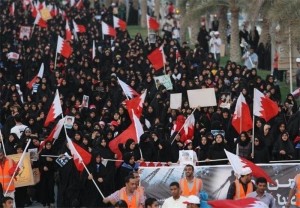 Bahrain�s Al Khalifa regime has learnt how to play the Western media while it pushes ahead with its harsh crackdown on popular protests, a US political analyst says.
Bahrain�s Al Khalifa regime has learnt how to play the Western media while it pushes ahead with its harsh crackdown on popular protests, a US political analyst says.Dr. Colin S. Cavell, who has taught at the University of Bahrain, made the remarks in an interview with�Press TVbroadcast on Wednesday.
�The Bahraini regime has learnt through its foreign advisory companies, like McKinsey & Company etc., how to play the Western media,� Cavell said.
�What you need to do is you issue reports from time to time, talking about human rights and how we are going to set up a commission to study human rights, or we are going to have a dialogue, but of course as we have seen in Bahrain not anything gets accomplished because there is no intention to give any type of concessions to the majority of the people. The Khalifa regime is entrenched, and they want to rule with an iron fist and they know how to play the Western media,� he added.
�That is why they have on retainer over sixteen public relations firms not only in the United States but also in London to make sure any detrimental news about Bahrain does not reach the public,� Cavell added.
He also said that �there is a very harsh crackdown going on, but what is amazing is the will of the (Bahraini) people. They are no longer afraid of the Al Khalifa family and they are fighting back and they are on the streets on a daily basis. It is truly impressive what they are doing.�
On Tuesday, Bahrain�s main opposition party said in a report that the Al Khalifa regime's crackdown on dissent has intensified over the past month, with the highest levels of violence since the uprising began in 2011.
The al-Wefaq National Islamic Society has documented 1,900 cases of human rights violations only in the month of September, including incidents in which regime forces used excessive force or torture.
According to the report, last month, 214 anti-regime protesters were arrested, including two women and 40 children, the highest number since the revolution began.
The al-Wefaq report also said that 111 activists, who were convicted by a Bahraini court and given sentences of up to 15 years, were tried based on fabricated charges.
On Monday, Bahrainis took to the streets in the northeastern island of Sitra for the sixth consecutive day to denounce the regime�s unrelenting crackdown on pro-democracy protests.
People from all walks of life attended marches in Sitra to demand reforms and an end to the decades-old rule of the Al Khalifa dynasty.
Earlier on Monday, a court in Bahrain sentenced nine anti-regime activists to life in prison after convicting them of being allegedly involved in an attack in November 2011 in the capital Manama.
Four of the defendants, who were present at the court, had previously said that they were subjected to torture and mistreatment in solitary confinement.
Five other defendants, tried in absentia, were handed additional 10-year jail terms for failing to hand themselves in.
The verdict brought to 104 the number of pro-democracy protesters sentenced to lengthy jail terms in Bahrain.
Similar rallies were also held in the villages of Nuwaidrat and Samahich close to Sitra, where protesters expressed solidarity with the detainees and condemned the unjust sentences.
Since mid-February 2011, thousands of pro-democracy protesters have staged numerous demonstrations in the streets of Bahrain, calling for the Al Khalifa royal family to relinquish power.
According to local sources, scores of people have been killed and hundreds arrested.
Physicians for Human Rights says doctors and nurses have been detained, tortured, or disappeared because they have "evidence of atrocities committed by the authorities, security forces, and riot police" in the crackdown on anti-government protesters.
By Press TV
The Iran Project is not responsible for the content of quoted articles.










